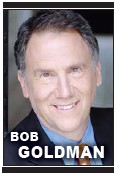Bob Goldman
Cheer up, ye ancient ones, 40 and above.
The life sentence that is your first career has been commuted.
Says who? Says career coach Octavia Goredema, author of “4 Strategies to Prepare for a Late-Career Shift” in the Harvard Business Review.
Happy with your current career? OK, but let’s be honest: Who has not paused on the way to the top of their chosen profession to ask, “Is that all there is?”
(It is, but don’t quote me.)
Once you’ve noticed that the grass is{mprestriction ids="1,3"} greener on the other side of the fence and decided that the perfect person to mow that grass is you, you’ll need an entry-level position. Considering that you’re competing with people who are cheaper to hire, easier to train and have many more years to go before reaching their “sell-by date,” you will need guidance.
This is where Goredema comes in. I’m following close behind, just to make sure you don’t do anything you’ll regret, like wasting your precious time reading this column.
No. 1: Own your age enthusiastically.
“Thirty-eight percent of hiring managers admitted reviewing an applicant’s resume with bias against their age,” according to a ResumeBuilder survey. The other 62 percent would happily hire old people if they would agree to keep their teeth in during client meetings and hide in the supply closet when top executives visit.
Nonetheless, “when you believe in yourself and are excited by your journey, it becomes infectious.” You know, like the symptoms of Dengue fever the hiring manager will experience when they discover how old you really are.
However you handle the age issue, you are advised to create a “career-change elevator pitch.”
Here’s mine: “Please push seven. My finger is sore. It’s the arthritis. What did you say? I forgot my hearing aids and I can’t hear a thing. We had real elevators in my day, with elevator operators who wore uniforms. Did I ask you to push seven? I can’t remember.”
If that doesn’t put an end to your journey, I don’t know what will.
No. 2: Identify multigenerational connections within your network.
Sure, you can hunt for “early- or mid-career professionals” who will “have valuable insights into what it takes to enter the industry and grow.” Who wouldn’t be happy to help an old codger who wants their job and will work for a whole lot less?
My advice is to cultivate friendships with no-career professionals. You’ll find these “reverse mentors” at comic-book conventions and Metallica concerts. You won’t learn much about your new industry, but you will find out how young people talk today, with expressions like “wassup” and “grinchy” and “23-skidoo.”
Slip these groovy expressions into your interviews and the hiring manager is sure to say, “You’re the cat’s pajamas!”
No. 3: 10X your job search.
Author Grant Cardone suggests you supersize the amount of work it will take to start a new career by 10 times. Think you’ll need 20 informational interviews? Plan on doing 200. It’s easy. Simply ask each person in your initial list of 20 to “recommend two or three people who I should speak to; then ask the new connections you’ve added to do the same thing.” And so forth and so on until simple math tells you that you’ve got a contact list that includes each of the 8,045,311,447 human beings on earth.
But don’t contact me. I’ll be napping.
No. 4: Practice your answers to tough questions.
You surely will be asked “how your previous skillset and background aligns with this specific role.”
Formulate an answer that highlights your mastery of basic job skills, like buttering up a manager, avoiding difficult assignments and casting blame on co-workers when everything goes wrong.
Make video recordings of your responses so you can “observe your body language.” If you sense the interview is not going well, you may find your answers are best delivered — and your wrinkles best hidden — if you interrupt the interview to clutch your heart, slip off the chair and fall face-down on the floor.
This will take the focus off your aging countenance, and you can lick the hiring manager’s boots at the same time.
Most important of all: Do not grow discouraged. As the EMTs carry you away, remain optimistic and committed to your belief that you are one old dog who can still learn new tricks. And if you can’t be optimistic, remember that when it comes to learning new tricks, there’s no dog better at howling at the moon.
Bob Goldman was an advertising executive at a Fortune 500 company. He offers a virtual shoulder to cry on at bob@bgplanning.com.
COPYRIGHT 2023 CREATORS.COM{/mprestriction}








